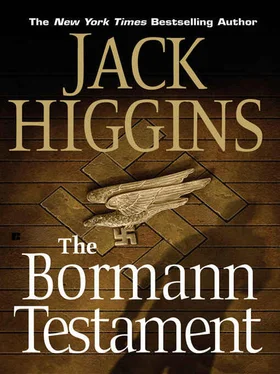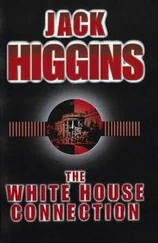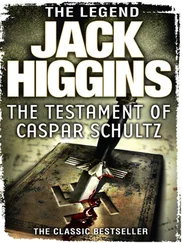Jack Higgins - The Bormann Testament (The Testament of Caspar Schultz)
Здесь есть возможность читать онлайн «Jack Higgins - The Bormann Testament (The Testament of Caspar Schultz)» — ознакомительный отрывок электронной книги совершенно бесплатно, а после прочтения отрывка купить полную версию. В некоторых случаях можно слушать аудио, скачать через торрент в формате fb2 и присутствует краткое содержание. Жанр: Триллер, на английском языке. Описание произведения, (предисловие) а так же отзывы посетителей доступны на портале библиотеки ЛибКат.
- Название:The Bormann Testament (The Testament of Caspar Schultz)
- Автор:
- Жанр:
- Год:неизвестен
- ISBN:нет данных
- Рейтинг книги:5 / 5. Голосов: 1
-
Избранное:Добавить в избранное
- Отзывы:
-
Ваша оценка:
- 100
- 1
- 2
- 3
- 4
- 5
The Bormann Testament (The Testament of Caspar Schultz): краткое содержание, описание и аннотация
Предлагаем к чтению аннотацию, описание, краткое содержание или предисловие (зависит от того, что написал сам автор книги «The Bormann Testament (The Testament of Caspar Schultz)»). Если вы не нашли необходимую информацию о книге — напишите в комментариях, мы постараемся отыскать её.
The Bormann Testament (The Testament of Caspar Schultz) — читать онлайн ознакомительный отрывок
Ниже представлен текст книги, разбитый по страницам. Система сохранения места последней прочитанной страницы, позволяет с удобством читать онлайн бесплатно книгу «The Bormann Testament (The Testament of Caspar Schultz)», без необходимости каждый раз заново искать на чём Вы остановились. Поставьте закладку, и сможете в любой момент перейти на страницу, на которой закончили чтение.
Интервал:
Закладка:
“He couldn’t have known much about it,” Chavasse said. “He must have been killed instantly.”
“At least we now know who we’re working against,” she said.
He nodded. “According to Schmidt, Steiner was a group leader in the SS. Kruger was probably a camp doctor or something of the sort.”
“Do you think they’ll be mentioned in Bormann’s memoirs?”
He shook his head. “I shouldn’t think so. My hunch is that they’re both simply active members of the Nazi underground. The people they take their orders from probably figure in Bormann’s book.”
“And you think they’ll have Muller at this clinic in Blankenese?”
“Let’s hope so.” He put down his coffee cup and got to his feet. “And now, if I can have the use of your couch?”
She went into the bedroom and came back carrying several blankets and a pillow. As he watched, she quickly made a bed for him. She turned with a smile. “I think you’ll find it’s pretty comfortable and I can promise you won’t be disturbed. I could sleep for a week myself.”
Suddenly, she seemed very close and he felt tired – really tired. “You’re very sweet, Anna,” he said.
She raised a hand and touched his cheek, and he bent his head quickly and kissed her on the mouth. For a moment, she responded, but as soon as she felt his hands on her waist, she pulled away and rushed across to her bedroom.
The door closed behind her. For a moment, Chavasse looked at it, and then he sighed and started to peel off his clothes. By the time he had finished, fatigue had seeped into his brain. He had barely enough strength left to crawl between the blankets and switch off the table lamp before he dived into darkness.
CHAPTER 6
He awakened slowly from a deep, dreamless sleep to an atmosphere of brooding quiet. Pale autumn sunlight reached in through the window, and faintly in the distance he could hear church bells and remembered it was Sunday.
He checked his watch and found, with something of a shock, that it was half past one. He threw aside the blankets and started to get dressed, and then he saw the letter propped against the flower vase on the small table.
It was from Anna. She had decided to pay Katie Holdt’s landlady a visit in the hope of getting a lead on the girl’s whereabouts. She expected to be back by three o’clock at the latest.
He lit a cigarette and went into the kitchen. He didn’t feel hungry, and ate only one buttered roll as he waited for his coffee to brew, and then returned to the living room.
He sat on the edge of the couch with the cup in both hands and wondered how Hardt was getting on. He felt restless and ill at ease, and he got to his feet and paced up and down the apartment. It was the inaction he hated. He preferred being in at the center of things, checking the other man’s move or making one himself.
On impulse he picked up the phone, rang the Atlantic Hotel, and asked for Sir George Harvey. There was a slight click as the receiver was picked up at the other end and Sir George spoke. “Yes, who is it?”
“Your traveling companion,” Chavasse said.
Sir George’s voice didn’t change. “I was hoping you’d ring,” he said. “I’ve had your boss on the phone from London. He asked me to pass on some information to you.”
“Is it important?”
“Nothing startling, but it might prove useful.”
“Good, we’d better get together then.”
“I’m afraid that’s going to be rather awkward,” Sir George told him. “I’ve hired a car and I’m driving out to the race track at Farmsen with some of the other conference delegates. We’re leaving in a few minutes. The first race starts at two-thirty.”
Chavasse considered the situation. He had been to Farmsen before to see the trotting races. They were usually well attended on a Sunday afternoon. He came to a decision quickly.
“I’ll meet you in the bar under the grandstand in the second-class enclosure at three o’clock,” he said. “Will that be all right?”
“I don’t see why not,” Sir George replied. “I can easily leave my friends in the first-class enclosure for a few minutes. As long as you think it’s safe to show your face.”
“Don’t worry about me,” Chavasse said. “I’ll only be a dot among several thousand people.” He replaced the receiver and hurriedly finished dressing.
He left a brief note for Anna, left the apartment, and walked through the quiet streets to the nearest station, where he caught a crowded underground train.
When they reached Farmsen, he mingled with the large crowd that streamed toward the entrance of the race track. As he passed through the turnstiles, he saw a couple of bored-looking policemen leaning against the barrier and chatting. He ignored them and moved on quickly, passing round the great curve of the track, and entered the second-class enclosure.
The first race was just finishing and he stood at the rail and watched the light, two-wheeled sulkies bounce on the corners, the drivers hanging grimly onto the reins as the horses trotted toward the finishing line at an incredible speed. There was a roar from the crowd, and a moment later, the result was announced over the loudspeaker.
He looked across into the first-class enclosure and checked his watch. There were still ten minutes to go. He sauntered across to the grandstand and went into the bar. For the moment, trade seemed to be slack and he ordered a beer and lit a cigarette. As he carried his drink across to a corner table, Sir George Harvey appeared in the entrance.
He came straight over and sat down. “Don’t you think you’re asking for trouble showing your face in a public place like this?”
Chavasse shook his head. “There’s safety in numbers.”
“I still think it’s damned risky,” Sir George said. “But now you are here, you can tell me what happened on that blasted train. Why did you have to kill Muller?”
“But I didn’t,” Chavasse said. “As far as I know, he’s still alive and kicking.” He went on to describe what had really taken place.
When he had finished, Sir George leaned back in his chair, a slight frown on his face. “It’s the most extraordinary thing I’ve ever heard of. So Steiner and this Kruger fellow are presumably working for the Nazi underground?”
“It certainly looks that way.”
“And this other chap,” Sir George said. “The one who saved your bacon. I suppose he’s working for the people who spirited Eichmann away to Israel?”
Chavasse nodded. “That’s about the size of it.”
Sir George shook his head in bewilderment. “You know, even during the war, when this sort of thing came under my department, I never heard anything quite like it. Dammit all, man, we went through six years of hell to give these Nazis what was coming to them, and here they are sticking their heads up again and apparently able to get away with it.”
“But not for long,” Chavasse said. “The very fact that they have to work underground is an encouraging sign.” He lit another cigarette. “You had a message for me.”
“So I did,” Sir George said. “I’m sorry, I was forgetting. Your Chief wanted you to know they’ve got a line on Muller. He was Bormann’s orderly. Apparently, in civilian life he’d been a valet. His family lived in Hamburg and he had one sister. They were all killed in the bombing in 1943. Does that help at all?”
Chavasse shook his head. “Not really. The only thing I didn’t already know was that Muller was once Bormann’s orderly. That at least explains their connection. The sister’s still alive. Until yesterday we knew where she was living and working, but for the moment we’ve lost track of her.”
“Then obviously you must find her again,” Sir George said. “She may be the key to the whole thing.”
Читать дальшеИнтервал:
Закладка:
Похожие книги на «The Bormann Testament (The Testament of Caspar Schultz)»
Представляем Вашему вниманию похожие книги на «The Bormann Testament (The Testament of Caspar Schultz)» списком для выбора. Мы отобрали схожую по названию и смыслу литературу в надежде предоставить читателям больше вариантов отыскать новые, интересные, ещё непрочитанные произведения.
Обсуждение, отзывы о книге «The Bormann Testament (The Testament of Caspar Schultz)» и просто собственные мнения читателей. Оставьте ваши комментарии, напишите, что Вы думаете о произведении, его смысле или главных героях. Укажите что конкретно понравилось, а что нет, и почему Вы так считаете.












